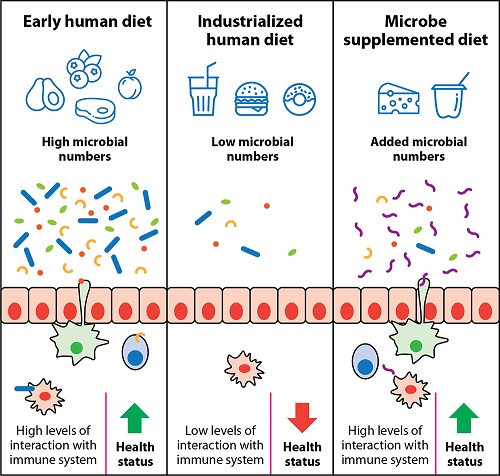Helping to Meet Nutritional Needs with Functional Foods

Breakfast, lunch, dinner, and two snacks. Five occasions to make great nutritional choices that can start the day off right, and keep it going strong. But often, it’s difficult to squeeze in a nutritious meal. And grabbing a snack on the go isn’t always the healthiest choice either. In this blog, we take a look at Kerry’s recent research on digestive and immune health and talk with Sonja Nodland, Kerry ProActive Health Principal Scientist, about how functional foods formulated with ingredients like probiotics can contribute to better-for-you choices.
What’s so bad about skipping a meal?
Let’s consider why it may be detrimental to health to skip a meal. Missing a meal may result in nutritional deficiencies for several reasons. Most obvious is that skipping a meal also means you’re skipping out on the opportunity to nourish your body with essential nutrients it needs to thrive. One study found that people who skipped breakfast had lower daily intakes of nutrients like thiamin, niacin and folate. As well, the study found that those who ate breakfast consumed more fiber and less fat and sugar overall. Other studies show effects of missed morning meals on school kids, associating breakfast with improved energy and focus.
So what’s a good way to get a quick fix?
Let’s be realistic. We’re time-crunched, some of us don’t feel hungry in the morning, or we simply choose to omit breakfast from our daily diet. Then when the inevitable hunger strikes, we sometimes react out of a glucose spike and grab readily available snacks—sometimes sugar- and fat-laden—to stabilize our plummeting energy levels.
On-the-go and convenient options can often be great for grabbing nutrients when we’re on the run. But these offerings have historically contained fat, sodium and sugar, providing minimal nutrition compared to the amount of empty calories and unfavorable ingredients.
Fortunately, these options are getting better-for-you makeovers. Over the last few years, fast-food and convenience-store foods have opted for ingredients like steel-cut oats, egg whites, and have added nutrients like protein to their fare, in response to increasing consumer awareness of what constitutes a healthier meal. And the rise in the functional foods movement adds a new opportunity to formulate foods for breakfast and every occasion, including snacks—with ingredients like probiotics that can help support digestive and immune health, as well as provide protein absorption benefits.
Breakfast is prime time
Although fortified foods with functional ingredients and added nutrients are available at any time of day, breakfast is the prime time for them. According to a recent study, breakfast is the optimum meal for the intake of certain vital nutrients, largely because typical breakfast foods are usually fortified with these nutrients.
Awareness of beneficial breakfasts is growing, too. Kerry’s 2021 research notes that two-thirds of global consumers consider breakfast a suitable meal occasion for products with healthy lifestyle benefits, like support for digestive and immune health. Kerry’s research also found that yogurts, cereals, granolas, and fruit and vegetable juices are typically the main categories of interest for consumers, and a logical fit with breakfast.
Making better snack choices
Due to breakfast’s role as a stabilizer of sugar levels and metabolism, missing this meal may lead to outsize snacking and less-healthy choices throughout the day. But health is an increasingly important consideration in snack choices. Innova’s 2021 report notes that “alternative” snack launches, with plant-based or other better-for-you offerings, were up by as much as a 75% CAGR (2016 – 2020).
Kerry’s 2021 research shows that globally, nearly a quarter of consumers surveyed would be interested in purchasing products if they contained ingredients which promoted digestive- and immune-health benefits, with 4 in 10 citing mid-morning, and more than a quarter saying evenings, are prime times for snacks with health benefits. Across the board, nearly a quarter of Kerry’s survey respondents listed sweet and savory snacks as preferred formats for products with digestive- and immune-health benefits.
The role of functional ingredients
 A 2020 study that examined whether the inclusion of safe, live microbes in the diet supports and improves health found that as modern diets have evolved, the microbes found in natural or fermented food sources have diminished with increased processing.
A 2020 study that examined whether the inclusion of safe, live microbes in the diet supports and improves health found that as modern diets have evolved, the microbes found in natural or fermented food sources have diminished with increased processing.
This may be one reason that our gut microbiomes are likely less diverse than they were a couple of centuries ago. A less diverse repertoire of “friendly” microorganisms interacting with the cells in our guts can contribute to less healthy days overall. The study also suggests that supplementing diets by including beneficial microbes like probiotics may support overall health by helping to regulate the gut microbiome.
Making the most of every mealtime
BC30™ is a well-researched probiotic that provides digestive-and immune-health benefits, as well as support for protein absorption. Because BC30 is a spore-former, it can deliver living microbes to the digestive tract. BC30’s protective shell allows it to better survive extreme temperatures – like microwaves and boiling water. It can also survive through your stomach acid until the probiotics arrive in your gut, where they team up with your own bacteria to help maintain a healthy microbiome. BC30’s survivability means it can be formulated into a variety of foods and beverages for every meal.
– Digest More –
Sources
Kerry Consumer Research, Digestive and Immune Health, 2021
Nutrients 2017 April; 9(4): 384.
Frontiers in Human Neuroscience 2013; 7: 425.
Journal of Nutrition Education and Behavior 2020 July; 52(7):S64
Journal of Nutrition, Volume 150, Issue 12, December 2020, Pages 3061–3067, https://doi.org/10.1093/jn/nxaa323


